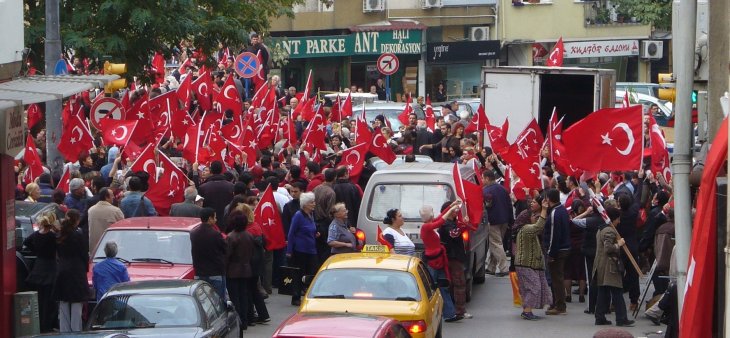From 2009 to 2015, Turkey’s Kurdish issue has been marked by successive initiatives aiming to end violence. However, following the June 2015 elections in Turkey, the peace process abruptly came to a halt, with the conflict escalating almost on a daily basis with armed confrontations between the PKK and the Turkish military and police forces. Our article on “Ontological insecurity in asymmetric conflicts: Reflections on agonistic peace in Turkey’s Kurdish issue” introduces and develops the concepts of ontological asymmetry and agonistic peace to make better sense of the failure of the 2009-15 peace process and offer remedies for the future.

Source: QuartierLatin1968. This file is licensed under the Creative Commons Attribution-Share Alike 3.0 Unported. https://commons.wikimedia.org/wiki/File:Anti-PKK_demonstration_in_Kadik%C3%B6y.jpg#file
All conflicts over time become embroiled in a certain set of self-conceptions and narratives vis-à-vis the Other. Ontological asymmetry develops in conflicts when one party is better able to have its narratives recognized and validated. Ontological asymmetry is common in ethnic conflicts because such conflicts often pit state parties with secure existence against ethnic groups with contested status and illegitimate standing. Whereas majority groups can rely on established historical and official discourses to maintain their self-narratives, minority groups face constant challenges.
We find that one notable shortcoming of Turkey’s 2009-15 peace process has been its inattentiveness to the implications of this ontological asymmetry. The non-recognition of the identity narratives of minority groups renders peace processes both easier to initiate and harder to conclude. During the 2009-2015 peace process, this was demonstrated in cyclical patterns of ambitious peace initiatives receiving greater support among the Kurdish public but giving way, at the first sign of crisis, to a rapid and dramatic return to violence, which neither side acted to stem.

Source: This file is licensed under the Creative Commons Attribution-Share Alike 3.0 Unported. Francis Tyers. https://commons.wikimedia.org/wiki/File:Pkk_supporters_london_april_2003.jpg#file
A successful resolution of conflict requires that parties attain ontological as well as physical security. Ontological security requires the development of new self-narratives where the Other is no longer the enemy. We find that the peace process in Turkey has not included conscious measures to construct new narratives and has not opened venues for different narratives to coexist and challenge the established conflict narratives. Because both parties perceive the other’s narratives as existential threats, attempts to enforce agreement and reconciliation proved difficult and counter-productive. For future peace attempts, we propose the pursuit of an agonistic peace, characterized by the co-existence of multiple and contestatory narratives, accommodation, and understanding.